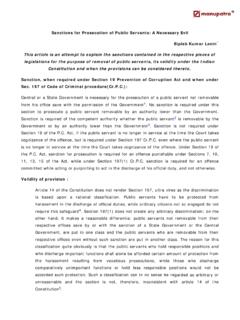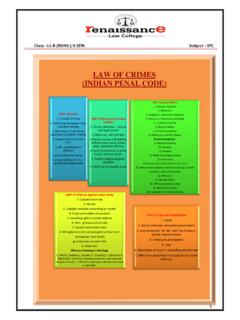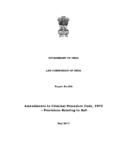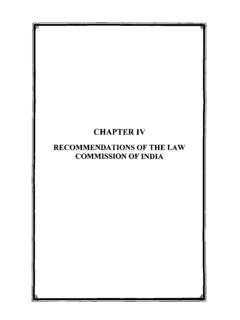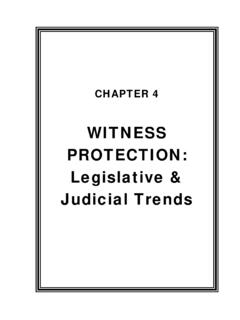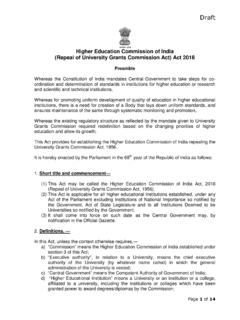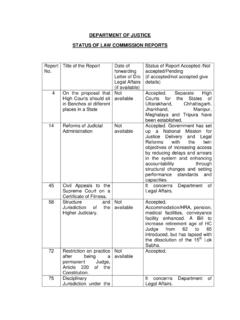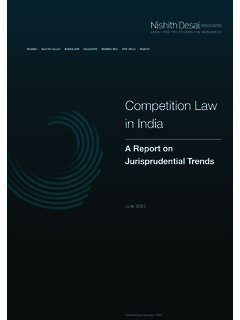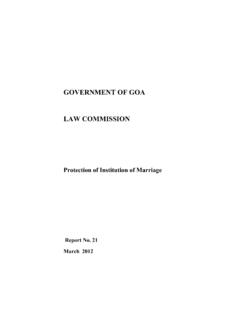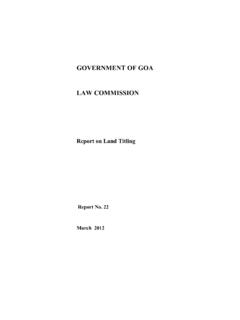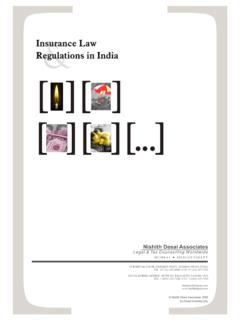Transcription of Law Commission of India - Manupatra
1 GOVERNMENT OF INDIALAW COMMISSIONOFINDIAAMENDMENT OF CODE OF CRIMINALPROCEDURE ENABLING RESTORATION OFCOMPLAINTSR eport No. 233 August 2009 LAW Commission OF India (REPORT NO. 233)AMENDMENT OF CODE OF CRIMINALPROCEDURE ENABLING RESTORATION OFCOMPLAINTSS ubmitted to the Union Minister of Law and Justice,Ministry of Law and Justice, Government of India by AR. Lakshmanan, Chairman, Law Commission ofIndia, on the .. day of August, 18th Law Commission was constituted for a period ofthree years from 1st September, 2006 by Order (LA) dated the 16th October,2006, issued by the Government of India , Ministry of Lawand Justice, Department of Legal Affairs, New Law Commission consists of the Chairman, theMember-Secretary, one full-time Member and seven part-time ble Dr. Justice AR. LakshmananMember-SecretaryDr.
2 Brahm A. AgrawalFull-time MemberProf. Dr. Tahir MahmoodPart-time MembersDr. (Mrs.) Devinder Kumari RahejaDr. K. N. Chandrasekharan PillaiProf. (Mrs.) Lakshmi JambholkarSmt. Kirti SinghShri Justice I. VenkatanarayanaShri SharmaDr. (Mrs.) Shyamlha Pappu3 The Law Commission is located in ILI Building,2nd Floor, Bhagwan Das Road,New Delhi-110 001 Law Commission StaffMember-SecretaryDr. Brahm A. AgrawalResearch StaffShri Sushil Kumar: Joint Secretary& Law OfficerMs. Pawan Sharma: Additional Law OfficerShri J. T. Sulaxan Rao: Additional Law OfficerShri A. K. Upadhyay: Deputy Law OfficerDr. V. K. Singh: Assistant Legal AdviserDr. R. S. Shrinet : Superintendent (Legal)Administrative StaffShri Sushil Kumar: Joint Secretary& Law OfficerShri D. Choudhury: Under SecretaryShri S. K. Basu: Section OfficerSmt. Rajni Sharma: Assistant Library & Information OfficerThe text of this Report is available on the Internet at:4 Government of IndiaLaw Commission of IndiaThe text in this document (excluding the GovernmentLogo) may be reproduced free of charge in any format ormedium provided that it is reproduced accurately and notused in a misleading context.
3 The material must beacknowledged as Government copyright and the title ofthe document enquiries relating to this Report should be addressedto the Member-Secretary and sent either by post to theLaw Commission of India , 2nd Floor, ILI Building,Bhagwan Das Road, New Delhi-110001, India or by emailto 5Dr. Justice AR. Lakshmanan (Former Judge, Supreme Court of India ),Chairman, Law Commission of IndiaILI Building (IIndFloor) Bhagwandas Road,New Delhi 110 001 Tel. 91-11-23384475 Fax. 91-11 No. 6(3)/177/2009-LC (LS) August, 2009 Dear Dr Veerappa Moily ji,Subject: Amendment of Code of Criminal Procedure Enabling Restoration of ComplaintsI am forwarding herewith the 233rd Report of the Law Commission ofIndia on the above criminal court has no power to restore a complaint dismissed indefault, as the accused stands discharged or acquitted depending on the casebeing a warrant-case or a summons-case.
4 In order to get the complaintrestored, a complainant, poor or rich, has to knock the door of the HighCourt under section 482 of the Code of Criminal Procedure 1973. If aMagistrate has the power to entertain a complaint and decide it on meritsafter summoning the accused, he should also have power to restore it ongood or sufficient cause being shown and re-summon the accused to facethe trial on have recommended in this Report appropriate amendments insections 249 and 256 of the Code of Criminal Procedure 1973 insertingprovisions on the lines of Order IX of the CPC, enabling restoration warm regards, Yours sincerely, (Dr AR.)
5 Lakshmanan)Dr M. Veerappa Moily,Union Minister of Law and Justice,Shastri Bhawan, New OF CODE OF CRIMINAL PROCEDUREENABLING RESTORATION OF COMPLAINTS 8 Commission S 141ST REPORT is a well settled law that a criminal court has no power like the onewhich a civil court possesses under Order IX of the Code of Civil Procedure1908 (CPC) to restore a complaint dismissed in default, as the accusedstands discharged or acquitted depending on the case being a warrant-case ora summons-case. In order to get the complaint restored, a complainant, pooror rich, has to knock the door of the High Court under section 482 of theCode of Criminal Procedure 1973 (CrPC). If a Magistrate has the power toentertain a complaint and decide it on merits after summoning the accused,he should also have power to restore it on good or sufficient cause beingshown and re-summon the accused to face the trial on relevant provisions of the CrPC are:(i)Section 249 relating to warrant-cases - Absence of When the proceedings have beeninstituted upon complaint, and on any day fixed for the hearing of thecase, the complainant is absent and the offence may be lawfullycompounded or is not a cognizable offence, the Magistrate may, inhis discretion, notwithstanding anything hereinbefore contained, atany time before the charge has been framed, discharge the accused.
6 (ii)Section 256 relating to summons-cases - Non-appearance or death of (1) If the summons hasbeen issued on complaint, and on the day appointed for theappearance of the accused, or any day subsequent thereto, to which8the hearing may be adjourned, the complainant does not appear, theMagistrate shall, notwithstanding anything hereinbefore contained,acquit the accused, unless for some reason he thinks it proper toadjourn the hearing of the case to some other day:Provided that where the complainant is represented by apleader or by the officer conducting the prosecution or where theMagistrate is of opinion that the personal attendance of thecomplainant is not necessary, the Magistrate may dispense with hisattendance and proceed with the case.
7 (2) The provisions of sub-section (1) shall, so far as may be, applyalso to cases where non-appearance of the complainant is due to hisdeath. 249 will not apply to a case in which the Magistrate tries anaccused for offences that are non-compoundable and cognizable. Thissection applies only to offences that may be lawfully compounded or arenon-cognizable. Therefore, the Magistrate has no discretion to discharge anaccused when the offences are of serious nature. Chapter XIX of the CrPCcontaining the procedure for trial of warrant-cases by Magistrates prescribestwo procedures, one for trial of cases instituted on police reports and theother for trial of cases instituted on private complaints. The law-makershave excluded non-compoundable and cognizable offences from thepurview of section 249 because for more serious offences, the police,generally, file regard to offences that are compoundable and non-cognizablewhere discretion is given to the Magistrate to discharge the accused for theabsence of complainant, the Magistrate may be vested with the power to9restore the complaint on file if sufficient cause is shown by the complainantfor his absence on the date of may be several reasons for the absence of complainant on thedate of hearing.
8 One most important cause may be total bandh call given bythe political parties or hartal where transport is suspended completely, bothpublic and private. This is a genuine cause for absence of complainant fromappearing before court. Complainant on his way to court may suffer severesetback necessitating hospitalization. He may suffer (a) heartache, (b) highBP, (c) low sugar leading to coma or (d) vertigo, etc. Death of a closerelation may be another sufficient cause. in each case if the complainant shows sufficient cause for hisabsence, the Magistrate may restore his complaint on file. The period maybe 15 days or 30 days from the date of discharge of the accused for movingthe regard to trial of summons-cases, under section 256, theMagistrate shall acquit the accused if the complainant does not appear onthe date of hearing.
9 The proviso to section 256 says that where thecomplainant is represented by a pleader or by the officer conducting theprosecution or where the Magistrate is of the opinion that the personalattendance of the complainant is not necessary, the Magistrate may dispensewith his attendance and proceed with the case. Here also there may besufficient reasons for the absence of complainant, examples of which havebeen given in the earlier paragraphs. Under section 256, a sub-section maybe added to the effect that if the complainant shows sufficient cause for hisabsence on the date of hearing, the Magistrate may restore the complaint on10file provided the application is filed within 15 days or 30 days from the dateof acquittal of the the CPC Order IX, Rules 4, 8 and 9 read as under: (i)Rule 4 - Plaintiff may bring fresh suit or Court may restore suit to a suit is dismissed under rule 2 or rule 3, the plaintiff may(subject to the law of limitation) bring a fresh suit.
10 Or he may applyfor an order to set the dismissal aside, and if he satisfies the Court thatthere was sufficient cause for such failure as is referred to in rule 2, orfor his non-appearance, as the case may be, the Court shall make anorder setting aside the dismissal and shall appoint a day forproceeding with the suit. (ii)Rule 8 - Procedure where defendant only Where the defendantappears and the plaintiff does not appear when the suit is called on forhearing, the Court shall make an order that the suit be dismissed,unless the defendant admits the claim, or part thereof, in which casethe Court shall pass a decree against the defendant upon suchadmission, and, where part only of the claim has been admitted, shalldismiss the suit so far as it relates to the remainder.
